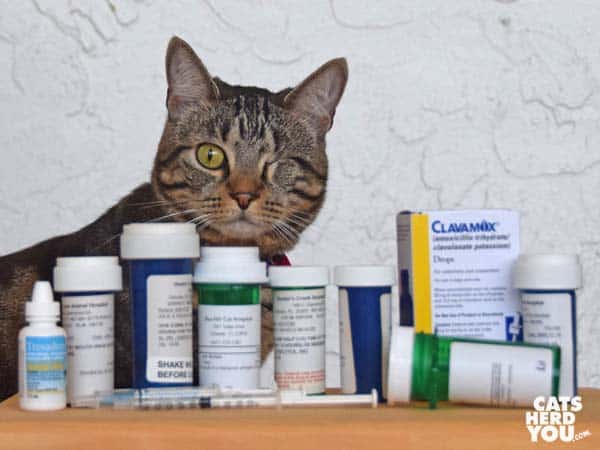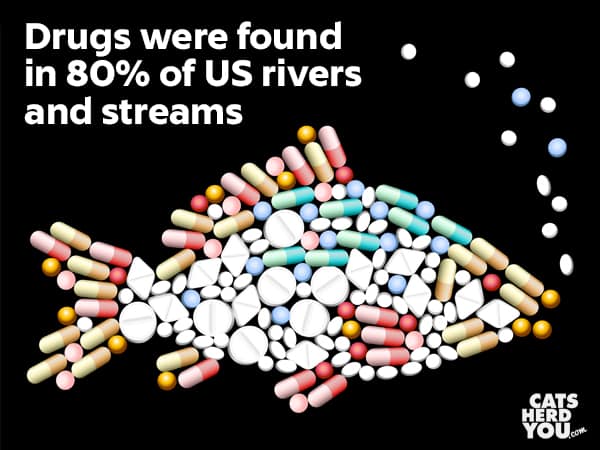During spring cleaning, I think I discovered that I am a veterinary prescription drug hoarder.
Pierre was prescribed an appetite stimulant and then started eating before they were all used. Ashton was prescribed liquid meds and I have to get pills instead. And so on. Pretty soon, we end up with all kinds of leftover medications.

The next logical question is how to get rid of them. Flushing unused medications down the toilet or drain is a bad idea. Water treatment plants are really meant for treating human waste, not for eliminating pharmaceuticals. That means medications flushed down the toilet are going into the environment, where they can sicken or kill wildlife. Drugs thrown into the trash end up in landfills, and those can seep into the environment, too.
The US Geological Survey has already found levels of drugs like antibiotics, hormones, and contraceptives in 80% of the rivers and streams tested in part of a nationwide study.Other studies have shown that fish and other wildlife can be adversely affected by pharmaceuticals, even after the medications are expired.

This Saturday, April 29th, there are drug take-back events across the US to allow you to safely dispose of your medications without endangering the water supply. You can locate an event near you on the US Drug Enforcement Administration’s web site US Drug Enforcement Administration’s web site.
If you need to dispose of medications other times of year, you can:
- Call your city or county government’s household trash and recycling service to ask whether a drug take-back program is available in your community. Some counties hold periodic household hazardous waste collection days, where over-the-counter and prescription drugs are accepted at a set location.
Ask your pharmacist whether he or she knows of any medicine disposal programs in your area. - Find a local, independent pharmacy in your area who participates in drug disposal through the disposemymeds.com.
- Locate another site in your area accepting drug disposals through the National Association of Boards of Pharmacy drug disposal locator.
- Ask your veterinarian. Only vets with state or federal authorization to collect medications for disposal can take back medication, but your vet might know of one.
If there aren’t any drug take-back events in your area, you can purchase special postage-paid packages from your local pharmacy that send medications back to a medical waste company. Some medications are ineligible for this program, so read the fine print before you purchase.
You can use most of these same resources for disposing of human medications, too, except your veterinarian is not likely to be able to help with unused human medications.
Let’s keep things that don’t belong in the trash out of it, including medications.
Reference and further reading
US Environmental Protection Agency, Contaminants of Concern Including Pharmaceuticals and Personal Care ProductsContaminants of Concern Including Pharmaceuticals and Personal Care Products
US Geological Survey, Pharmaceuticals, Hormones, and Other Organic Wastewater Contaminants in U.S. Streams
US Department of Justice, National Take-Back Initiative








Thanks so much for the PSA!
Great information, Julie! Sometimes my regular vet will take them back, but otherwise I’ve always participated in the drug take-back events, usually about the same time as hard-to-recycle events so it’s a great time to plan on a thorough clean of things we’ve been holding on to until we figured out a safe thing to do with them.
mom says this is a good reminder to go through the cabinets – heaven knows what is hanging out in there
That is good to know. It is nice to see responsible stewards of our environment.
Wonderful information and very timely for spring cleaning! Thank you for sharing!
We quadruple the words here on this post.
What a great PSA
Hugs madi and mom
This is a great post! It is important to dispose of old medications properly. And um, yes…you look like a bit of a veterinary medication hoarder from that photo. LOL
I hadn’t even thought of this! I can’t remember what I did with Kitty’s prednisolone or insulin after she died. Luckily with Bear, we used every bit of any medication we’ve got. Though I have a few tubes of things like Lactulose that have expired.
That is a terrific idea! We usually don’t have many leftovers.
Great post. I have quite a collection to get rid of too.
Sheesh…it’s like a pharmacy around here! The mom asked our vet about how to dispose of old medicines and she told her to put the meds in used kitty litter and toss. The mom has been doing that but wasn’t totally comfortable with it. She’ll ask the human pharmacist next time she’s there.
Great information! They were just talking about this on our local news too and how dangerous it is when meds get flushed.
Securing medications in a container and tossing them in the trash is generally a safe way to dispose of them.
You can also contact your local animal shelter to see if they can use the meds. Some will take them, some won’t. They have rules to follow about drugs and tampering and such. Vets can use human medications for pets, but it depends on the medication and your relationship with your vet. My vet took some very useful & expensive medications from me when we no longer needed them.
Very interesting ! In Switzerland, you can give your old meds backs to any pharmacy at any time. Purrs
This is such a great post. Many of my angel furbabies have left me with mountains of medications. I have found stashes of antibiotics, steroids, appetite stimulants, controlled substances like buprenorphine, etc. I feel like the worst sort of hoarder, keeping these things around. That being said, thank you for these fantastic tips!
So many people don’t even think about this. In the past I’ve been guilty of this too